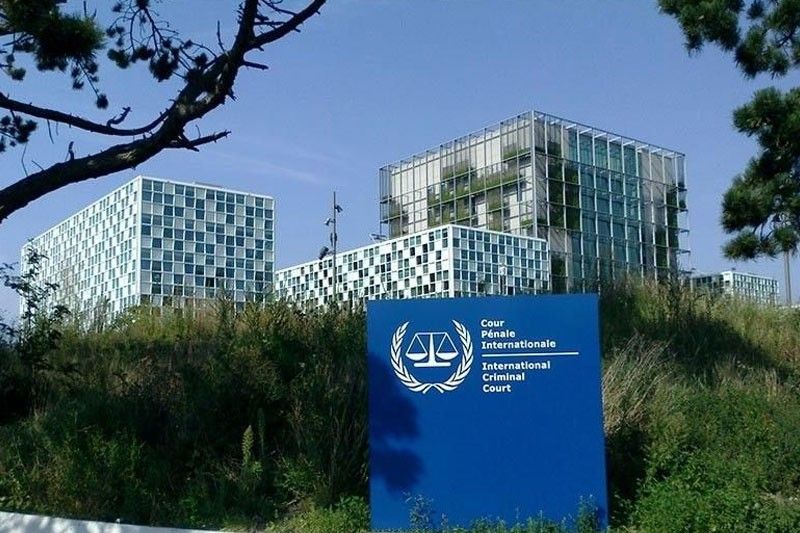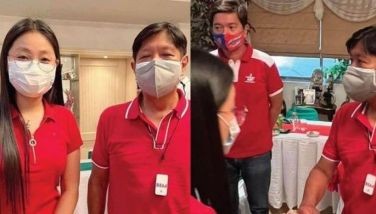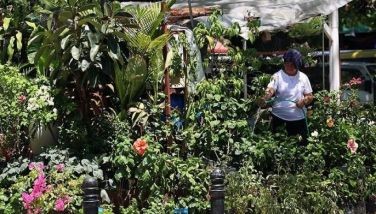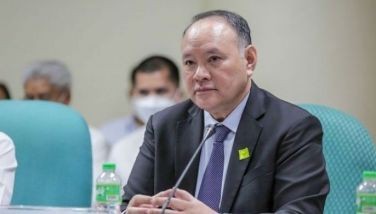‘ICC probe a threat to Philippine sovereignty’

MANILA, Philippines — The government will not cooperate with the International Criminal Court (ICC)’s ongoing probe of former president Rodrigo Duterte for his bloody drug war, President Marcos said yesterday, calling the investigation a “threat” to the country’s sovereignty.
In an interview in Baguio City after attending the Philippine Military Academy’s alumni homecoming, Marcos underscored that his position that the ICC has no jurisdiction over the country has not changed.
“I have stated it often, even before I took office as President, that there are many questions about their jurisdiction and what can be – what we in the Philippines regard as an intrusion into our internal matters and a threat to our sovereignty,” he said.
“So until those questions of jurisdiction and the effects on the sovereignty of the Republic are sufficiently answered, I cannot cooperate with them,” he added.
The President maintained that the Philippines has a well-functioning justice system, which enables it to hold perpetrators of crimes accountable.
“So no, I do not see what their jurisdiction is. I feel that we have in our police, in our judiciary, a good system. We do not need assistance from any outside entity,” he said.
He added that the Philippines is a sovereign nation and will not consider the ICC investigation to be a legitimate judgment.
The ICC has authorized Special Prosecutor Karim Khan to resume the investigation into Duterte’s bloody drug war and Davao Death Squad killings, as it was not satisfied that the country is undertaking relevant probes that would warrant a deferral of its probe.
Former president and incumber Pampanga 2nd District Rep. Gloria Macapagal-Arroyo earlier led the filing of a resolution defending Duterte from the ICC investigation.
Arroyo, who is also senior deputy speaker, urged lawmakers to adopt the resolution and declare their “unequivocal defense” of the former president.
Duterte has been accused by the ICC of committing crimes against humanity over the deaths tied to his drug war. More than 6,000 drug suspects have been killed in the previous administration’s drug war based on government data.
In 2019, the Philippines officially cut ties with the ICC after it launched a preliminary probe into the thousands of drug-related deaths during Duterte’s term.
The ICC suspended its investigation after Manila said it was already looking into the crimes.
Marcos had said he is not inclined to rejoin the ICC, since the justice system in the country is working.
Meanwhile, Khan has urged judges to dismiss the Philippine government’s plea to suspend the investigation into the alleged crimes against humanity committed in relation to the Duterte administration’s deadly campaign against illegal drugs.
“The Philippines has not provided any argument substantiating its request for suspensive effect, nor shown that implementation of the Decision would create an irreversible situation or one that would be very difficult to correct or that could potentially defeat the purpose of the appeal,” Khan said in his four-page submission to the ICC Appeals Chamber dated Feb. 16.
“No such grounds for granting suspensive effect exist,” he added.
In its earlier notice of appeal, the Philippines – through the Office of the Solicitor General (OSG) – asked the ICC judges to suspend the investigation while the earlier decision of the Pre-Trial Chamber is on appeal.
The assailed decision granted Khan’s request to proceed with its investigation into the situation in the Philippines.
In his latest submission, Khan noted that the Philippines could continue with its investigations and domestic proceedings irrespective of the ongoing prosecution’s investigation while the appeals chamber decides on the merits of the appeal.
“The Appeals Chamber is likewise able to reverse, confirm or amend the decision irrespective of the prosecution’s investigation. Should the Appeals Chamber eventually decide to reverse the decision, any relevant investigation by the prosecution would be discontinued,” he said.
“Accordingly, there is no irreversible situation or one that would be very difficult to correct or that could defeat the purpose of the appeal arising from implementation of the decision during the course of the appeal proceedings,” he added.
In a separate decision, the ICC Appeals Chamber granted the Philippine government’s request for an additional period to file its appeal brief, which will contain arguments against the earlier decision that it wants the chamber to reverse.
“The Appeals Chamber considers that the Republic of the Philippines has provided valid reasons in support of its application. In particular, it notes the new administration’s logistical and administrative complaints,” the decision dated Feb. 17 read.
In its application, the government said the OSG is still awaiting reply from relevant government agencies regarding pending investigations.
It also cited challenges in gathering comprehensive data and relevant records due to the change in administration, as well as the process of complying with requirements for engaging the services of an external counsel or consultant.
The Appeals Chamber gave the Philippines until March 13 to file its appeal brief, from the original Feb. 19 deadline.
In a related development, the head of the House of Representatives committee on dangerous drugs yesterday backed House Resolution 780, which defends Duterte from the ICC probe into the former president’s war on drugs.
Surigao del Norte Rep. Robert Ace Barbers, who chairs the committee, has expressed his “full and unequivocal support” for the resolution, saying “the war on drugs abated what could have been an irreversible disaster – that of our country becoming a narco state.”
“As chairman of the House committee on dangerous drugs during the whole Duterte administration, I have seen the gravity of the drug problem first-hand. My position gave me privilege access to all information on the real situation,” Barbers said in a statement.
Sponsored by Arroyo, the resolution defends Duterte from the ICC’s move to investigate the latter over the anti-drug war of his administration.
Barbers, however, said “years of neglect corrupted institutions and transformed them into weak weapons against the illegal drug trade.”
He added that Duterte’s ascent into the presidency was actually “a blessing for this country.”
“I am sure that if he did not become the president, we are now a certified narco state. His tough resolve to fix the problem gave us all the hope and the breathing space we badly needed,” Barbers said.
For the Mindanaoan lawmaker, to vilify Duterte “is to say that his policy on the war against drugs was a big mistake” when it should be the other way around.
“More importantly, (Duterte’s) policy should not be equated to the situation on the ground. Policy is different from implementation,” Barbers said.
He added that if those who were tasked to implement the policy overdid it and committed abuses, the former president “should not be faulted for them.” – Janvic Mateo, Sheila Crisostomo
- Latest
- Trending


























